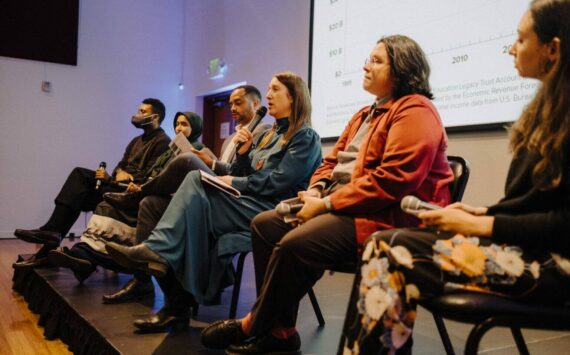By Morf Morford
Tacoma Daily Index
“There will come a time when it isn’t ‘They’re spying on me through my phone’ anymore. Eventually, it will be ‘My phone is spying on me’.” – Philip K. Dick
Here’s a moral dilemma for our times; social media sites, among many others traffic in our aggregated but personal data.
Should we be complicit in it – and profit from it?
Is our data “personal” in any sense of the word or is it the semi-accidental collection of encounters and expressions any of us have in a “connected” world?
Big data is precisely that – massive amounts of data that listens in and digests every factoid it can absorb until it finds a useful (and profitable) place to spit it out.
Every device, app or website is a vacuum for any and every scrap of data.
In other words big data is huge but nonspecific.
Get ready for smarter, more specific data.
And more intrusive data collection.
What’s your own data worth to you?
Is data, in any form, smaller, bigger, more personalized, or less, the answer to our problems? Or the problem that defies any answer?
Here’s one view; “When we have all data online it will be great for humanity. It is a prerequisite to solving many problems that humankind faces.” – Robert Cailliau, Belgian informatics engineer and computer scientist who, together with Tim Berners-Lee, developed the World Wide Web.
If you wish to participate in your own information aggregation and dispersal – in other words, participate in a profit-sharing program in your own life, you can do that.
You just might generate an additional, possibly even lucrative income stream. Details can be found here – https://www.cbs17.com/news/investigators/startup-company-will-give-you-money-to-sell-your-data-to-advertisers/
Who decides what our personal data is worth?
And who decides who should – or should not – have access to it?
If you are not paying for the product, you are the product
Nothing sums up a dystopian future landscape and economy better than the realization that all of the “free” services and our much-loved devices that we use many hours every day are really, like some sci-fi evil and alien force, scavenging our thoughts, conversations, and yes, photos, for its own devious purposes.
In other words, a constant flow of free information – from us – is the basis of most social media companies’ business model.
Facebook’s terrible, no good, very bad month
October of 2021 will certainly be a pivotal month for Facebook.
A CBS 60 Minutes segment featuring a prominent Facebook whistle-blower (you can see it here – https://www.youtube.com/watch?v=_Lx5VmAdZSI) described Facebook as being destructive to our political atmosphere and processes, our mental health, our young people (especially girls) and even contributes, or is, at the very least, a forum for ethnic violence and human trafficking.
And the company does all of that with an eye on corporate profits with, according to the whistle-blower, a rampant disregard for individual, social or political consequences.
Besides the public relations fiasco that was broadcast on 60 Minutes, Facebook had a 6 hour outage on the first Monday of the month.
It cost the company about 160 million dollars.
Mark Zuckerberg’s stock loss hit $6 billion.
The outage included Instagram and messaging service WhatsApp.
It wasn’t hackers. It was internal gateway protocols and configuration changes.
And this is the company almost half of the world’s population use on a regular basis – 40% of Americans use it every day.
It would be difficult to make the argument that Facebook, or social media as a whole, have made us better citizens and neighbors – or even better human beings.
It would be far easier to believe that social media,and Facebook most of all, has made us more insecure, less trusting, more pessimistic and more fearful – and our young people less prepared to face the challenges and responsibilities of adult life.
From lies about rigged elections to sheer medical quackery during a pandemic to nutty conspiracies about chemtrails and lizard people, where else, besides Facebook will you have access to such so-called information?
Have we reached peak Facebook?
For more and more of us, this transaction that we may have not entirely voluntarily entered is becoming more and more questionable.
A coalition of advocacy groups is calling on Facebook and Instagram users to log out of both platforms for one day on November 10.
Facebook deactivation
If you want to temporarily deactivate your Facebook account:
From your main profile, click the arrow icon in the extreme top right corner of Facebook.
Select Settings & Privacy, then click Settings.
Click Your Facebook Information in the left column. If you have Facebook access to a page in the new Pages experience: Click Privacy, then click Your Facebook Information.
Click Deactivation and Deletion.
Choose Deactivate Account, then click Continue to Account Deactivation and follow the instructions to confirm.
I’ve been wondering how young people, those who never knew a world before social media, will cope with, or even leave behind the digital landscape we have built around them.
The internet is forever, we used to say, but I think we need a better definition of forever.





